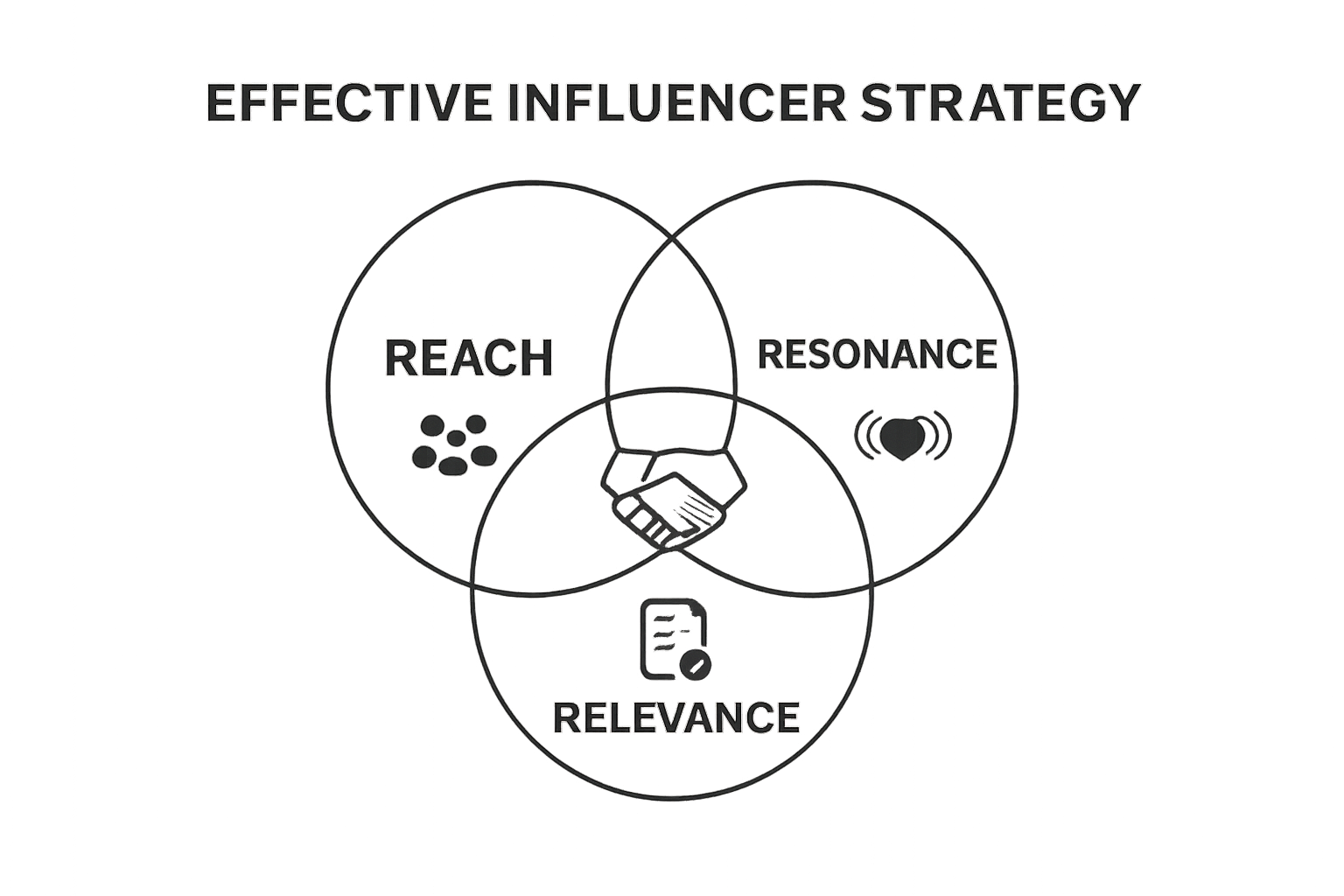What Is Rebranding and Why It Matters

Explore what is an influencer strategy and why it matters for entrepreneurs, service providers, and growing businesses seeking meaningful engagement.

Everyone is chasing digital ad clicks and viral moments, but brands using influencer strategy are playing a different game. In fact, studies show that relevance and resonance matter more than sheer follower count when driving real engagement. While most companies still fixate on flashy numbers, the biggest impact comes from connecting with exactly the right voice, not just the loudest one.
An influencer strategy represents a deliberate, structured approach to leveraging digital personalities who can authentically communicate brand messages to targeted audiences. Unlike traditional advertising, this strategy focuses on building meaningful connections through trusted voices that resonate with specific consumer segments.

Influencer strategy is not merely about selecting popular personalities, but understanding the intricate dynamics of digital influence. Research from Wiley’s Marketing Journal suggests that successful strategies encompass three critical attributes:
Developing an effective influencer strategy requires clear alignment between brand goals and influencer selection. This means moving beyond vanity metrics like follower count and focusing on qualitative aspects such as audience demographics, content authenticity, and potential for meaningful brand storytelling.
Key strategic considerations include:
Ultimately, an influencer strategy transforms digital personalities from mere promotional channels into strategic brand partners who can meaningfully amplify messaging and drive targeted consumer actions.
The following table summarizes the core components of an effective influencer strategy, clarifying the key focus areas and their strategic importance for successful campaigns.
| Component | Description | Strategic Importance |
|---|---|---|
| Reach | Potential audience size an influencer can access | Expands message delivery |
| Relevance | Alignment of influencer content and audience with brand | Ensures message credibility |
| Resonance | Emotional connection and engagement generated | Drives authentic audience interaction |
| Audience Alignment | Matching influencer demographics to target market | Optimizes campaign targeting |
| Quality Engagement | Depth and meaningfulness of audience interactions | Builds lasting relationships |
In the contemporary digital ecosystem, an influencer strategy has become a critical component of sophisticated marketing approaches. Modern consumers increasingly seek authentic connections and trusted recommendations over traditional advertising methods, transforming how brands communicate and engage with their target audiences.
Research from ResearchGate highlights that influencer strategies help brands overcome significant marketing challenges by providing genuine, relatable content that resonates with specific audience segments. Traditional advertising often feels impersonal and manipulative, whereas influencer collaborations offer a more nuanced, human-centered approach to brand storytelling.
Key advantages of leveraging influencer strategies include:
An effective influencer strategy transcends simple exposure. It represents a sophisticated method of building long-term brand relationships, creating narratives that extend beyond transactional interactions. By carefully selecting influencers who genuinely align with brand values, businesses can craft compelling stories that organically integrate product messaging.
Strategic considerations that elevate influencer marketing include:
Ultimately, an influencer strategy is not just a marketing tactic but a sophisticated approach to building meaningful digital connections that transform passive consumers into active brand advocates.
Constructing a robust influencer strategy requires a systematic approach that goes beyond simple collaboration. It demands a comprehensive understanding of digital ecosystems, audience psychology, and strategic brand positioning.
Marketing Research Quarterly emphasizes that successful influencer strategies prioritize precise audience matching over broad reach. This means selecting digital personalities whose followers closely mirror a brand’s target demographic and psychographic profile.
Critical alignment factors include:
Effective influencer strategies require structured collaboration models that protect brand integrity while empowering creative expression. This involves establishing clear guidelines that provide influencers creative latitude while maintaining consistent brand messaging.
Key strategic collaboration elements encompass:
Ultimately, a sophisticated influencer strategy transforms digital partnerships from transactional interactions into strategic brand extensions that generate meaningful audience connections.
Influencer strategies are not one-size-fits-all solutions, but dynamic frameworks that can be meticulously tailored to address specific business objectives. The strategic flexibility of influencer marketing allows brands to craft nuanced approaches that align precisely with their unique growth and communication targets.
Sustainable Development Research reveals that effective influencer strategies require thoughtful matching between campaign objectives and influencer selection. Different business goals demand distinct influencer engagement models that optimize specific marketing outcomes.
Key strategic adaptation dimensions include:
Brands must recognize that influencer strategies are sophisticated instruments capable of addressing multiple strategic priorities simultaneously. This requires developing flexible collaboration models that can pivot between different engagement objectives while maintaining consistent brand narrative.
Strategic considerations for objective-based influencer adaptation include:
Ultimately, a sophisticated influencer strategy transforms digital partnerships into strategic instruments that can be precisely calibrated to drive targeted business outcomes.
This table compares how influencer strategies can be adapted to support different business goals, highlighting the influencer type, engagement model, and expected outcome for each objective.
| Business Goal | Influencer Type | Engagement Model | Expected Outcome |
|---|---|---|---|
| Brand Awareness | High-visibility/macro | Broad campaign | Large-scale message exposure |
| Lead Generation | Niche micro-influencer | Targeted, focused content | High-quality lead acquisition |
| Product Launch | Domain expert | Product validation review | Increased credibility & interest |
| Long-term Loyalty | Ongoing brand partner | Sustained collaborations | Strong, lasting brand advocacy |
Real-world case studies demonstrate the transformative potential of well-executed influencer strategies, revealing how strategic digital partnerships can drive substantial brand engagement and business outcomes across diverse industries and marketing objectives.
Harvard Business Review highlights that successful influencer strategies go beyond mere product promotion, creating immersive storytelling experiences that connect brands with audiences through authentic, relatable narratives.
Compelling influencer strategy examples include:
Successful influencer strategies are distinguished by their ability to deliver measurable business outcomes. This requires moving beyond vanity metrics like follower count and focusing on substantive engagement indicators that directly correlate with business goals.
Key performance measurement approaches involve:
Ultimately, effective influencer strategies transform digital personalities from simple promotional channels into sophisticated brand storytellers who can meaningfully connect with target audiences.

Are you feeling frustrated by influencer efforts that fail to connect or drive real impact? The article explores the complexity of influencer strategy and underscores one common struggle: the challenge of turning scattered collaborations into a system that truly aligns with your brand’s goals and creates measurable outcomes. Many entrepreneurs and small business owners recognize the importance of authenticity, reach, and resonance, yet find themselves stuck with inconsistent messaging, mismatched partners, or campaigns that lack depth.

At Reasonate Studio, we turn influencer strategies into clear, actionable frameworks tailored for brands who want to grow with confidence. Using our Aligned Impact Model™, we help you go beyond quick wins and build systems that leverage influencers as true brand partners—not just promoters. If you are ready to stop guessing and build a marketing approach that is both strategic and sustainable, visit Reasonate Studio’s homepage to see how our blend of intentional design and market insight can move your business forward today. Don’t let another campaign slip by without achieving the clarity and impact you deserve. Explore how we can help you align your marketing for lasting growth.
An influencer strategy is a structured approach to utilizing digital personalities to promote brand messages authentically. It focuses on building genuine connections with targeted audiences through trusted voices.
An influencer strategy is important because it helps brands rebuild consumer trust through authentic voices, offering a more personal and relatable form of communication compared to traditional advertising.
Success can be measured by tracking conversion rates from influencer content, analyzing audience engagement depth, monitoring changes in brand perception, and evaluating the return on influencer investment.
Key components include audience and influencer alignment, establishing strategic collaboration frameworks, focusing on qualitative engagement metrics, and ensuring a clear connection between brand goals and influencer selection.